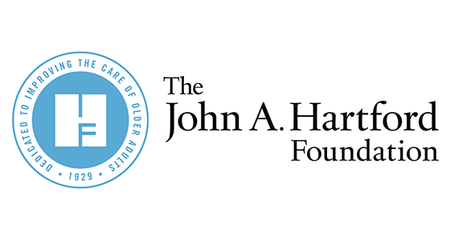New Grants Totaling Over $12 Million Approved by JAHF Board of Trustees

The John A. Hartford Foundation Board of Trustees approved grants totaling $12,350,005 for six initiatives that will spread age-friendly care focused on what matters to older adults and family caregivers, including in emergency departments and home-based care, and through advocacy and a new rural project.
University of North Carolina at Chapel Hill, Yale University and American College of Emergency Physicians: Geriatrics Emergency Department 4.0: Accreditation, Dissemination, Sustainability and Evaluation ($4,027,565 for 3 years)
This initiative will make emergency department care more age-friendly for older adults through three grants. A grant to the University of North Carolina at Chapel Hill will continue support for the Geriatrics Emergency Department Collaborative (GEDC) to reach 10,000 emergency department clinicians with educational resources, consultation and training. A grant to Yale University will support the GEDC by continuing to study the evidence of impact from geriatric emergency department interventions, with 25 manuscripts planned for the Journal of Emergency Medicine. The American College of Emergency Physicians will receive funding to continue the Geriatrics Emergency Department Accreditation (GEDA) program, which recognizes emergency departments for meeting a set of standards and best practices. The GEDA program aims to expand from the current 370 accredited sites to 900 emergency departments, reaching over four million older adults. The John A. Hartford Foundation will continue partnering with the West Health Institute to support this initiative.
Yale University: Patient Priorities Care Phase III: Dissemination and Sustainability ($2,971,997 for 3 years)
This grant will support further dissemination of Patient Priorities Care, an approach that helps older patients and clinicians focus all health care decision-making on what matters to older adults based on their own health priorities. Pilot findings have shown the approach reduces medications and unnecessary diagnostic testing and increases appreciation by patients and clinicians for attention to goals, reduced care burden, and improved quality of life. Grant funding will help expand the number of health professionals trained in the approach, integrate it into health care professionals training curricula, and embed it as a key component for addressing “what Matters” in the Age-Friendly Health Systems 4Ms framework (what Matters, Medication, Mentation and Mobility). Funding will also support adapting and disseminating the approach to underserved populations and those living with dementia.
Johns Hopkins University School of Medicine, Home Centered Care Institute, American Academy of Home Care Medicine and Duke-Margolis Center for Health Policy: Moving and Scaling Home-Based Primary Care, Phase III: Quality, Training, Advocacy and Policy ($2,889,592 for 3 years)
Four grants will help build home-based primary care into health care delivery and health policy in the U.S. as a critical component of age-friendly care. The National Home-Based Primary Care Learning Network will be expanded (Johns Hopkins University School of Medicine); the Home Centered Care Institute will educate the current and emerging workforce with a repurposed, age-friendly home-based primary care curriculum; the American Academy of Home Care Medicine will refine a centralized, comprehensive database and directory of home-based primary care practices; and the Duke-Margolis Center for Health Policy will advance policy reforms that expand access to home-based care. Several of the organizations receive co-funding from the RRF Foundation for Aging and Josiah Macy Foundation.
National Alliance for Caregiving: The National Campaign for the RAISE National Strategy: Action Toward Implementation ($985,851 for 2 years)
Through this grant, the National Alliance for Caregiving (NAC) will lead a national campaign to implement elements in the 2022 National Strategy to Support Family Caregivers, released in September 2022. NAC will catalyze policy action and federal-level coordination by engaging with key stakeholders, policymakers and program administrators on the federal level both directly and by coordinating with health system leaders, caregiver and patient advocacy groups, policy organizations and state-level coalitions. The project’s other goals include ensuring transparency and accountability related to existing commitments from federal agencies, tracking progress toward implementation, identifying measurable outcomes related to implementation efforts and determining viable opportunities for legislative and policy change needed to build on what can be accomplished under existing authority.
Center for Medicare Advocacy, Community Catalyst and Justice in Aging: General Operating Support: Advancing Equity for Older Adults ($900,000 for 3 years)
Renewal funding for general operating support grants to three national advocacy organizations will continue to help ensure access to high-quality health care for older adults and support for family caregivers. The advocacy organizations include the Center for Medicare Advocacy, Community Catalyst and Justice in Aging. The organizations will specifically target discrete populations that include low-income women, people of color, people with disabilities, LGBTQ+ older adults and limited English-proficient older adults.
National Rural Health Association: National Rural Age-Friendly Initiative: Planning Grant ($575,000 for 1.5 years)
This planning grant to the National Rural Health Association (NRHA) will develop resources, partnerships and strategy for the implementation of a National Rural Age-Friendly Initiative to build age-friendly care for the one in five older adults living in rural geographies. The NRHA, a national nonprofit organization with more than 21,000 members, will use four approaches: convenings, communication, educational activities and community health worker trainings to produce a plan for the implementation of the national initiative and develop resources, policies, best practices, publications and a community health worker training curriculum.
